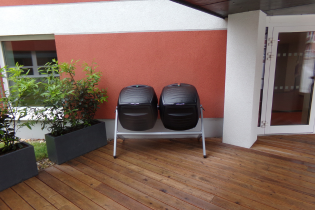Sorting of bio-waste at FSV UK

Sorting of bio-waste at FSV UK
Students and employees of FSV UK now have the opportunity to sort bio-waste. At the initiative of the faculty Sustainability Working Group, a new rotating two-chamber compost bin has been placed in the Jinonice Campus between buildings B and C. It enables bio-waste processing into a nutritious compost that can be used as a source of nutrients for plants at the faculty and in the surrounding area.
How does the compost bin work?
For example, plant debris such as apple peelings, banana or citrus peelings, or coffee grounds can be fed into the composter. One chamber of the composter will always be open and ready for bio-waste. The second closed chamber will be used to mature the compost. Compost in this type of compost bin takes about ten weeks to mature. We expect the first harvest during the summer.
What belongs in the composter:
- vegetable and fruit scraps and peelings (please cut the spoiled bits in half before disposal)
- coffee grounds, leached tea (not bagged unless it explicitly says it belongs in the compost)
- eggshells crushed into dust or tiny pieces
- grass clippings, leaves
- wood chips
The following do not belong in the composter:
- nut shells and pits
- meat and fish scraps and dairy products
- sawdust from chipboard
- chemically treated residues
- glass, plastic, metal, and everything that belongs in mixed waste and colored containers
If you have any questions, please contact the head of the Sustainability Working Group, Ing. Bc. Petra Koudelková, Ph.D. The working group will inform students and employees of FSV UK about the possibility of collecting compost for their use.





